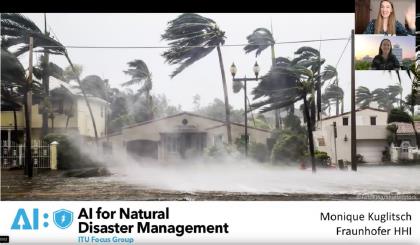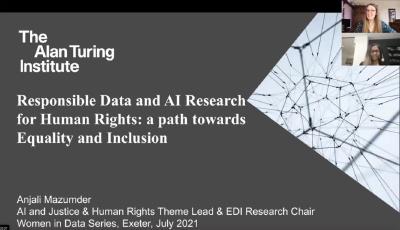2021 Researcher Led Initiatives
In 2021 we had 21 applicants for the RLI awards, with 13 initiatives being successful. Due to the COVID-19 pandemic the majority of the RLI awards in 2021 took place online. We would like to thank all applicants for applying and to those who attended any of our events.
Click here for this year's Researcher Led Initiative awards.
Award holder: Rachel Beaney
In partnership with Pragda Spanish Film Club and the Modern Languages departments of Cardiff University and the University of Exeter, Screening the Child, Spanish Film club was a virtual film festival that ran from 1/02/21 - 12/03/21. The festival featured a series of educational film screenings and discussions titled ‘Screening the Child: the Child’s Gaze in Spanish Language Cinema.’ Curated by Rachel Beaney, Ph.D. student in Hispanic Studies, this festival brought together five films that feature a child protagonist.
Read Rachels full report here: Spanish Flim Club - Report
Award holder: Malcolm Richards
The Black Educators Book Club was developed to build upon existing working collaborations between Race, Ethnicity and Education (REEN: University of Exeter) and the Stephen Lawrence Research Centre (SLRC: De Montfort University Leicester). The format was to arrange a ‘book club’ event on the last Friday of each month, in which participants would read an available piece of literature as selected by the co-facilitators. A guest discussant would be invited to share some brief reflections of the reading, before the wider participants engage in an open dialogue. A key change was to record the guest discussant presentation. This made no affect to budget or delivery, but helped to offer the content to wider audiences (see YouTube channel).
Award holder: Meghan Plumridge
The Problem
As researchers, we dream of helping to solve the world’s problems. Data holds the key to understanding the urgent global issues our world is facing, so it’s no surprise that data-related jobs present the fastest growing industry in the world. But there is a big problem in the world of big data. According to The Alan Turing Institute “women represent 47% of the workforce, yet hold less than 17% of all available tech jobs.”
The Initative
This Women in Data seminar series was a brand-new initiative featuring inspirational women sharing their career stories and tips for women+ considering data-related careers. This professional development activity was a Researcher-Led Initiative that was funded by the University of Exeter Researcher Development & Research Culture Team.
The Speaker
Dr Monique Kuglitsch - Chair of the ITU/WMO/UNEP Focus Group on AI for Natural Disaster Management - shared her story and tips for getting into the field of AI, as well as the challenges and opportunities that she is currently facing with the application of AI for natural disaster management. View the seminar recording here.

Dr Anjali Mazumder – theme lead on AI and Justice & Human Rights at the Alan Turing Institute and Research Chair for Equality, Diversity and Inclusion - shared her story and tips for getting into AI, and discussed her work on the application of AI for the prevention of slavery. View the seminar recording here.

The Audience
This course was (and still is!) open to all postgraduate research students and early-career researchers at the University of Exeter, but is particularly inspiring and insightful for women+ who are keen to learn about opportunities and tips for getting into the field of AI and data science.
The Results
The aim of this series was to promote equality and diversity and develop an engaged research culture. This series has triggered expressions of interest for the establishment of a 'Women in Data' society and community that continues beyond the initial series and encourages further conversations. The learning outcomes of the seminar series were:
- To discover tips and advice for building a career in data and AI-related fields
- To hear inspiring stories from women leading the way in data science and AI
- To learn about the challenges and opportunities that exist in the field of AI for natural disaster management and the prevention of slavery and human trafficking
Join the initiative: If you are interested in joining a society for Women+ in Data, please express your interest here.
Award holder: Sumita Roy
Choose to be a parent- When you are flying high in your career and then the thought of becoming a parent is sometimes really scary. You think that will be the end of your career. Although people say that career breaks doesn’t matter at all, but even now you will find getting back to work after a career break is very difficult and particularly it is true for women in science or any discipline. However, during this workshop I realise it is a tough journey to be a parent and also be successful in your career but it is possible. You just have to go with the flow and look for opportunities and grab it. Being a mother is not the end of career in STEMM. You just need to prioritise your needs and organisation really helps. Try to get as many help as possible you can get. Choose your employer wisely. Also always try to find a mentor in your organisation as they can play an important role in career development or career shaping. I wouldn’t change anything about being a mum for myself. For now I am trying to establish myself in my field but I am sure slowly and carefully I will get there if I am determined. Therefore, I think no one should give up their aspiration and work towards it. Sometimes listening to inspiring parents with successful career really help to boost your own will, this is what I helped me in this workshop and I am taking the message from this workshop engraved in me. If anyone interested in listening to the talk, please email: Sumita Roy- S.Roy@exeter.ac.uk.
From the funding of this RLI the following books are available in the University of Exeter Library:
- The Research Funding Toolkit: How to Plan and Write Successful Grant Applications- by Jacqueline Aldridge and Andrew Derrington
- Lean in: Women, Work, and the Will to Lead- by Sheryl Sandberg

Award holder: Sreeram Valsalakumar
Social media platforms have become more popular and become a vital tool for academics and researchers to discuss, disseminate and collaborate. While LinkedIn emphasises employment and business-related content, using LinkedIn to promote the research or the research collaboration needs a different strategy. The workshop we conducted with the help of RLI funding, ‘’The Power of LinkedIn for an Effective Research Collaboration,’’ focused on demonstrating a comprehensive pathway for PhDs and ECRs to enhance their LinkedIn profiles. It is found that the researcher’s networking on LinkedIn provides a range of benefits like connecting other researchers, journal editors, publishers via the direct messaging feature, sharing the latest research updates and opportunity for collaboration. Building the first-line connections or identifying the right people such as researchers or experts in the same fields is crucial for improving your research subject promotion and discoverability.
Jennifer Corcoran, CEO and Founder of My Super Connector, hosted the workshop, and she is a Pitman-accredited LinkedIn trainer. Recently she received prestigious awards like Social Media Influencer of the Year and the number 1 LinkedIn Adviser in the UK 2020. The workshop already had a two 45-55 minutes session, including a live LinkedIn demo and Q&A sessions. Moreover, this aligned to the theme “developing an engaged research culture” and “building a PGR or ECR community.’’ More research-oriented activities in LinkedIn enhances the accessibility of scientific research results, and it promotes the EDI values.
LinkedIn Id, Jennifer Corcoran: https://www.linkedin.com/in/jennifercorcoran1/
Please get in touch with Sreeram Valsalakumar, sv353@exeter.ac.uk for workshop recordings.
Award holder: Julie Pepper
Psychology lecturers, Dr Julie Pepper and Dr Kat Ashbullby, used their Researcher-Led Initiative Award to kickstart a “Full STEAM Ahead” network of PGRs/ECR’s at Exeter. They held an online 3-hour workshop in June. 18 participants from a range of subjects – maths, humanities, physics, engineering, medicine, psychology and computer science - attended. We hope we inspired the attendees to rethink the relationship between science and art and consider how they could use the arts in their work. We heard from Miss Cath Hale and Dr Will Stahl-Timmins. Cath, who is an exhibiting artist, shared her extensive experience in project management and University Knowledge Exchange. Will Stahl-Timmins, Information designer at The BMJ who describes himself as, “Transforming medical research data into visual treats,”shared his insights with us. Dr Houry Melkonian also introduced us to @Lego serious play.
In the long term we hope to keep the network going. We have a university blog website page with the name FullSteamAhead that we need to develop. We have a met with the Exeter Science Centre and are having a meeting with them and full steam ahead members, We have secured a stall at the Sidmouth Science Festival in October and we are looking at what we can do for this. We plan to have regular meetings and hope the network can work together to help (1) convey PGR’s/ECR’s research in a reimagined way, (2) assist in the design of university campaigns around health/environmental messages and (3) work to engage children/adolescents in STEM.
Award holder: Beth Roberts
As part of the Researcher-led Initiative Award, we organised a training workshop for Early Career Researchers on unconscious bias and micro-aggressions. We felt that training in this area is currently lacking, but it is crucial for shaping future research, and future researchers. This was a collaboration between the College of Medicine and Health (CMH) and the Business School (UEBS), working with the Race Equality Officer and the Chief Diversity Officer respectively.
To deliver the workshop, we worked with an external company called BCohCo Ltd, whose ethos is Building Cohesive Communities together. They provide training to organisations on Diversity, Inclusion, Cohesion and Equality (DICE™), to help people develop both professionally and personally. We ran two workshops on the same day, both using Zoom. Participants were a mixture of PhD and Postdoctoral researchers from CMH and UEBS.
The sessions run by BCohCo are fantastic, because they move away from EDI as a tick-box exercise. During the workshop, participants are asked to fully engage, ice-breakers help this along. For example the hands of privilege ice-breaker where participants put up both their hands, spreading their fingers, and are asked a series of questions. Depending on their response, they put down or keep up a finger. At the end of the exercise, everyone will have different numbers of fingers left up which represents their privilege. It is a really effective tool to see each other as human beings, with different backgrounds and life stories.
Another key element of the BCohCo workshops, are that they are safe spaces. Participants have opportunities to ask questions in a judgement free zone, and can share their own personal experiences. There is plenty of time for reflection, and although the workshop has set topics and items to cover, it is flexible so that if a particular topic arises that the group is interested in this can be explored during the session.
After the session, one of the main pieces of feedback we got was that people wished it had been longer! This was incredible, as 3-hours in one sitting is a long time, especially over Zoom and especially for such a complex topic. However this shows that our ECR community wants and needs this training. In the future, we hope that this training will be made available more widely across the University.
